Peter Bagge
Interview with Peter Bagge
by David Paul
Alright, straight up honest: this one is a treat for me. As a cartoonist myself it’s not often that I get a chance to bring respected cartoonists to a site dedicated primarily to comic books. Because, let’s face it, cartoons and comics don’t always play in the same sand box.
Peter Bagge grew up in the suburbs of New York City, one of five in a healthy Catholic household. Those of you who grew up Catholic yourself know exactly what that means. He attended the School of Visual Arts just before he began working for Punk Magazine where he worked with the likes of John Holmstrom, Ken Weiner, Bruce Carleton, J.D. King and Kaz. In addition he gained valuable experience with the great Art Spiegelman. Now, if you’re not familiar with those names I am offended. So that means you have homework.
Let’s jump in right there.
David: Peter, thanks for dropping by InvestComics and allowing a silly twit like me to ask you a bunch of questions. Very cool.
Peter: That’s a question?
David: Punk Magazine wasn’t around for very long but in its short run it was a success in the underground. You were pretty young in your career. Talk to us about the good ol’ days. What was it like?
Peter: I never appeared in the original run of PUNK. They went out of business before they printed any of my comics. I appeared in a later one shot issue, though. I socialized with the PUNK staff (all cartoonists, it seems) afterwards. They were a wild, funny and contrary bunch of people. A breath of fresh air compared to most artist types I net in NYC at the time.
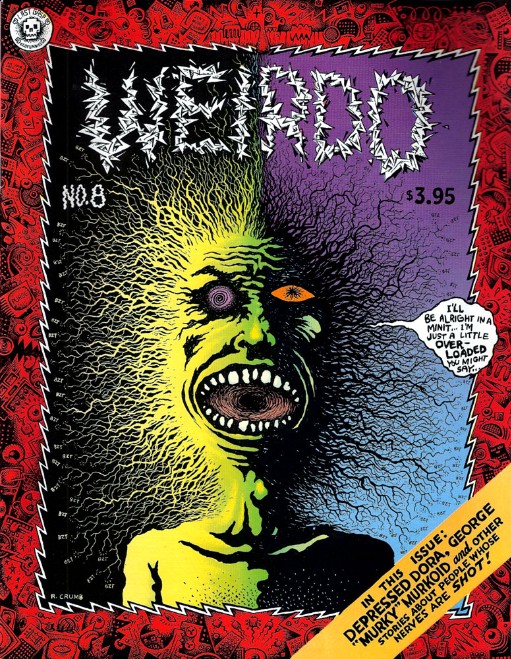 David: So in 1980 when Punk folded you had gathered a fair amount of knowledge and experience. Were you nervous at all about what you would do next?
David: So in 1980 when Punk folded you had gathered a fair amount of knowledge and experience. Were you nervous at all about what you would do next?
Peter: I wasn’t “nervous” so much as desperate to get some kind of a career going. I did a little bit of everything just to make money, though I invested most of my energies towards developing and drawing my own comic book stories.
David: So Comical Funnies ended up in Crumb’s Weirdo and you established this working relationship with one of the most well-known underground cartoonists in America. How did the relationship develop to the point he decided to just give the editorial job over to you?
Peter: It went from me sending him my work to him running it in WEIRDO to him asking me to be the managing editor of the thing, all over the course of 3 or so years. I hadn’t even met him at the time. This was all through the mail and telephone.
David: Artistically you’ve often captured the wacky movement of those old Warner Brothers cartoons. But I have to tell you that I see a lot of Crumb’s influence. Your work hasn’t been as extensive as his but it’s certainly been just as satirical. Your days on Weirdo must have produced some unique experiences.

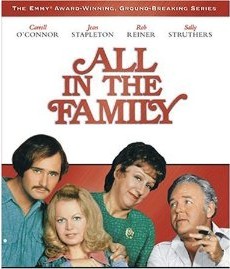 Peter: The Warner Bros cartoons certainly were a huge influence, visually and otherwise, though R Crumb and Charles Schulz were also huge, esp. when it comes to writing and dialog. I often “hear” them echoed in my earlier work when I re-read them. The same with MAD. I also “hear” other unmistakable influences like Kurt Vonnegut, Woody Allan and even ALL IN THE FAMILY!
Peter: The Warner Bros cartoons certainly were a huge influence, visually and otherwise, though R Crumb and Charles Schulz were also huge, esp. when it comes to writing and dialog. I often “hear” them echoed in my earlier work when I re-read them. The same with MAD. I also “hear” other unmistakable influences like Kurt Vonnegut, Woody Allan and even ALL IN THE FAMILY!
David: You managed to stay outside the mainstream back then and produced a number of great independent titles in the 80’s with Fantagraphics. Most notable is probably Neat Stuff. But which of those was your own personal favorite?
 Peter: The only title I created on my own in the 1980s was NEAT STUFF. So that one was my favorite by defult!
Peter: The only title I created on my own in the 1980s was NEAT STUFF. So that one was my favorite by defult!
David: The 90’s – oh man, the 90’s. What a decade! And what a series you gave us in the title of Hate. So the big explosion of “alternative” culture was blowing up and here comes this title series that in my opinion is still applicable as satire. Lots of people can say this and that regarding what they think Hate is about, and what they take from it. But, from you, what’s it really about? C’mon!
Peter: It was a reflection of a younger version of myself, though I was still trying to make sense of the world I was then living in as well in those comics.
 David: Okay, so up to the end of the 90’s you avoided the mainstream. But the first title series you worked on for DC (Yeah!) was illustrated by Gilbert Hernandez. (did you do any of the illustrations for that title?) Later you worked on Sweatshop with a creative team. Big difference going from doing your own writing and art.
David: Okay, so up to the end of the 90’s you avoided the mainstream. But the first title series you worked on for DC (Yeah!) was illustrated by Gilbert Hernandez. (did you do any of the illustrations for that title?) Later you worked on Sweatshop with a creative team. Big difference going from doing your own writing and art.
Peter: I never deliberately avoided mainstream comics. It was just a simple case of neither of us having any use for each other. I agreed to do YEAH! and the other titles for Marvel and DC because of the good guaranteed money, as well as the opportunity to work on something radically different.
David: I know you did a number of other projects in the mainstream but the one I want to ask you about the most is The Incorrigible Hulk for Marvel. That title was never released as its own series. What happened there?*Editor’s note: The Incorrigible Hulk was later published in Marvel Knights’ relaunched mini-series Strange Tales.*

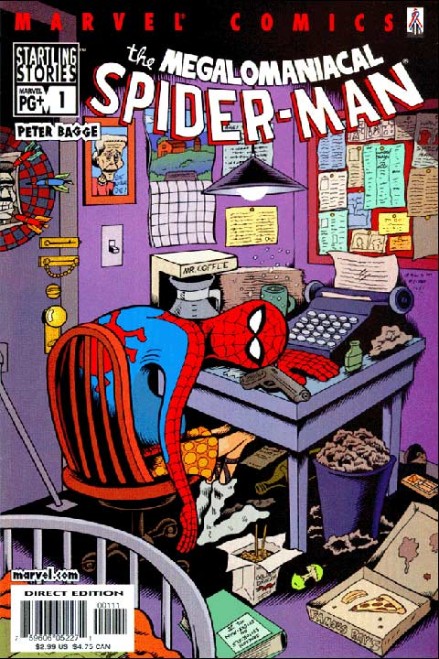 Peter: Marvel was purchased by a new company that was horrified with that comic, and thus refused to release it. These folks paid a fortune for Marvel, and thus were obsessed with protecting the brand.
Peter: Marvel was purchased by a new company that was horrified with that comic, and thus refused to release it. These folks paid a fortune for Marvel, and thus were obsessed with protecting the brand.
David: Away from Marvel and DC, tell us the truth: what’s it like working for Dark Horse?
Peter: They’re fine! I mainly just deal with their editors, all of whom have been very pleasant to work with.
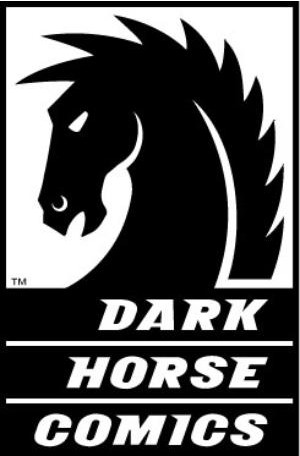 David: Some of my favorite works of yours are published in Mad Magazine. But you’ve been doing some non-silly work for Discover Magazine. That’s very important sounding.
David: Some of my favorite works of yours are published in Mad Magazine. But you’ve been doing some non-silly work for Discover Magazine. That’s very important sounding.
Peter: Ha! I only did 6 strips for DISCOVER. Budget cuts on their end put an end to that, unfortunately. I really enjoyed doing those strips, though it involved a LOT of homework on my part, since I’m not a huge science buff. RE: MAD: I only do an occasional illustration job for them. I’ve never written for them.
David: I’m excited about your new project Reset. Let’s talk about that.
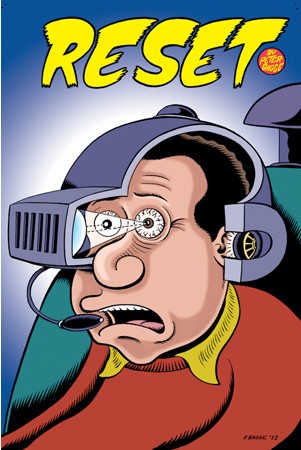 Peter: It’s about a stand-up comic and film actor who out of financial desperation agrees to take part in a computer program that allegedly allows you to virtually re-live your life.
Peter: It’s about a stand-up comic and film actor who out of financial desperation agrees to take part in a computer program that allegedly allows you to virtually re-live your life.
David: In some ways it sounds like it could be a silly theme. But I get the sense there’s a tone of seriousness to it as well.
Peter: Originally I envisioned it being a story where someone really DOES re-live his life! But that would’ve been too fantasy/sci-fi for my tastes and abilities, so I opted for a far more plausible scenario. In fact, the story wound up being much more about his current messed up REAL life than his virtual new-and-improved past one.
David: As our hero revisits his life are there moments he’s going to be forced into re-living that he would much rather not?
Peter: Yes, and they’re presented as an opportunity to “fix” mistakes or tragedies from his past. It’s a bit more complicated than that, though. I don’t want to give too much away!
David: Where did the inspiration for this come from?
Peter: From me thinking “I wish I knew then what I know now”, which is something I do with far greater regularity as I get older.
David: As a satirical cartoonist is it easier to approach social commentary?
Peter: I… guess? Actually, I think all art is social commentary.
David: You’ve been doing this for a good long while now. Do you ever feel a personal responsibility to comment on society from one decade to the next? In fact, how would you describe your job?
Peter: At this point it’s just trying to make a decent living doing not only what I do best, but they ONLY thing I know how to do. I should’ve been a plumber!
 David: Sofia Vergara has stated she wants to marry you for– oh wait. I’m sorry. Question for another interview I’m setting up with someone else. Peter, good sir, you are an inspiration. Much thanks and appreciation. I’m looking forward to Reset.
David: Sofia Vergara has stated she wants to marry you for– oh wait. I’m sorry. Question for another interview I’m setting up with someone else. Peter, good sir, you are an inspiration. Much thanks and appreciation. I’m looking forward to Reset.
Peter: No, that was me. Ms. Vergara has a hard time taking no for an answer.
*RESET from Dark Horse – Order it from your local comic shop now!!

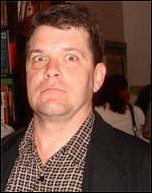
pin up yukle: pin up kazino – pin up casino azerbaycan
п»їbest mexican online pharmacies: mexican pharmacy online – reputable mexican pharmacies online
https://northern-doctors.org/# mexican drugstore online
mexican drugstore online mexican pharmacy online buying prescription drugs in mexico
pharmacies in mexico that ship to usa: northern doctors pharmacy – mexico pharmacies prescription drugs
https://northern-doctors.org/# mexico pharmacy
https://northern-doctors.org/# mexican pharmacy
buying from online mexican pharmacy: Mexico pharmacy that ship to usa – mexican online pharmacies prescription drugs
mexican drugstore online mexican pharmacy northern doctors mexican drugstore online
pharmacies in mexico that ship to usa: Mexico pharmacy that ship to usa – mexican online pharmacies prescription drugs
https://northern-doctors.org/# п»їbest mexican online pharmacies
mexico pharmacies prescription drugs: mexican pharmacy northern doctors – mexico drug stores pharmacies
https://northern-doctors.org/# mexican mail order pharmacies
http://northern-doctors.org/# mexican border pharmacies shipping to usa
pharmacies in mexico that ship to usa: Mexico pharmacy that ship to usa – mexican online pharmacies prescription drugs
medicine in mexico pharmacies northern doctors buying prescription drugs in mexico online
mexican rx online: northern doctors pharmacy – medicine in mexico pharmacies
http://northern-doctors.org/# mexican rx online
mexican pharmacy: mexican pharmacy northern doctors – medication from mexico pharmacy
п»їbest mexican online pharmacies: northern doctors – reputable mexican pharmacies online
https://northern-doctors.org/# buying prescription drugs in mexico online
https://northern-doctors.org/# mexican mail order pharmacies
mexican rx online: buying prescription drugs in mexico – mexican border pharmacies shipping to usa
pharmacies in mexico that ship to usa: Mexico pharmacy that ship to usa – mexican rx online
https://northern-doctors.org/# buying prescription drugs in mexico
http://northern-doctors.org/# mexican border pharmacies shipping to usa
purple pharmacy mexico price list: medicine in mexico pharmacies – п»їbest mexican online pharmacies
mexican mail order pharmacies mexican pharmacy п»їbest mexican online pharmacies
buying prescription drugs in mexico mexican pharmacy northern doctors mexican online pharmacies prescription drugs
http://northern-doctors.org/# mexico pharmacy
mexican rx online: mexican northern doctors – best online pharmacies in mexico
http://northern-doctors.org/# mexican rx online
mexican mail order pharmacies mexican pharmacy northern doctors п»їbest mexican online pharmacies
mexico pharmacy: mexican pharmacy northern doctors – medication from mexico pharmacy
https://northern-doctors.org/# mexican pharmaceuticals online
mexican pharmaceuticals online: Mexico pharmacy that ship to usa – buying from online mexican pharmacy
best online pharmacies in mexico: northern doctors pharmacy – mexican online pharmacies prescription drugs
https://northern-doctors.org/# mexican online pharmacies prescription drugs
mexican online pharmacies prescription drugs: mexican online pharmacies prescription drugs – buying prescription drugs in mexico
https://northern-doctors.org/# mexican drugstore online
mexican pharmaceuticals online mexican pharmacy online reputable mexican pharmacies online
https://northern-doctors.org/# buying prescription drugs in mexico
https://northern-doctors.org/# purple pharmacy mexico price list
mexican pharmacy: mexican northern doctors – medication from mexico pharmacy
mexico drug stores pharmacies: mexican northern doctors – mexico drug stores pharmacies
http://northern-doctors.org/# mexican online pharmacies prescription drugs
buying from online mexican pharmacy: Mexico pharmacy that ship to usa – mexican pharmacy
http://northern-doctors.org/# mexican online pharmacies prescription drugs
buying prescription drugs in mexico northern doctors best online pharmacies in mexico
best online pharmacies in mexico: mexican pharmacy – mexico pharmacy
https://northern-doctors.org/# mexican pharmaceuticals online
mexican online pharmacies prescription drugs: northern doctors pharmacy – medication from mexico pharmacy
buying from online mexican pharmacy: mexican pharmacy – mexico pharmacies prescription drugs
https://northern-doctors.org/# medication from mexico pharmacy
medicine in mexico pharmacies: mexican pharmacy – reputable mexican pharmacies online
п»їbest mexican online pharmacies: mexican pharmacy – mexican pharmacy
https://northern-doctors.org/# mexican mail order pharmacies
mexican rx online: mexican pharmacy online – mexican pharmaceuticals online
medicine in mexico pharmacies mexican northern doctors mexican online pharmacies prescription drugs
http://northern-doctors.org/# mexican online pharmacies prescription drugs
medication from mexico pharmacy: Mexico pharmacy that ship to usa – mexican rx online
https://northern-doctors.org/# buying prescription drugs in mexico
https://cmqpharma.online/# mexican rx online
best online pharmacies in mexico
mexico drug stores pharmacies cmq pharma mexican pharmacy purple pharmacy mexico price list
best online pharmacies in mexico cmq pharma mexican pharmacy buying from online mexican pharmacy
pharmacies in mexico that ship to usa: mexico pharmacy – mexican pharmaceuticals online
mexico drug stores pharmacies cmq pharma mexican pharmacy purple pharmacy mexico price list
buying prescription drugs in mexico cmq pharma mexican pharmacy pharmacies in mexico that ship to usa
mexican mail order pharmacies
https://cmqpharma.com/# buying prescription drugs in mexico
mexican border pharmacies shipping to usa
reputable mexican pharmacies online cmq pharma mexico drug stores pharmacies
п»їbest mexican online pharmacies cmq pharma medicine in mexico pharmacies
п»їbest mexican online pharmacies mexico drug stores pharmacies medication from mexico pharmacy
best online pharmacies in mexico cmq pharma buying prescription drugs in mexico
best online pharmacies in mexico mexican online pharmacy buying from online mexican pharmacy
mexican border pharmacies shipping to usa cmq pharma mexican pharmacy mexican pharmaceuticals online
https://cmqpharma.com/# buying prescription drugs in mexico
medicine in mexico pharmacies
mexican rx online online mexican pharmacy medication from mexico pharmacy
buy medicines online in india india pharmacy indianpharmacy com
canadian pharmacies compare: the canadian pharmacy – safe online pharmacies in canada
https://indiapharmast.com/# mail order pharmacy india
mexican border pharmacies shipping to usa: buying prescription drugs in mexico – mexican mail order pharmacies
Online medicine home delivery: buy prescription drugs from india – indianpharmacy com
canadianpharmacyworld com: canadian valley pharmacy – canadapharmacyonline legit
canadian pharmacy 24 trustworthy canadian pharmacy pharmacy rx world canada
mail order pharmacy india buy prescription drugs from india top 10 pharmacies in india
reputable indian pharmacies: india pharmacy mail order – reputable indian online pharmacy
canada drugs reviews: canadian pharmacy victoza – pharmacy canadian superstore
buying prescription drugs in mexico online: medication from mexico pharmacy – mexican border pharmacies shipping to usa
mexican border pharmacies shipping to usa: mexico drug stores pharmacies – mexico pharmacy
https://foruspharma.com/# mexican drugstore online
reputable indian pharmacies: india online pharmacy – п»їlegitimate online pharmacies india
safe canadian pharmacy safe reliable canadian pharmacy canadian pharmacy king reviews
medicine in mexico pharmacies: mexico pharmacies prescription drugs – reputable mexican pharmacies online
buy prescription drugs from india indian pharmacies safe indian pharmacies safe
online pharmacy india: Online medicine home delivery – п»їlegitimate online pharmacies india
canadian pharmacy service: canadian mail order pharmacy – canadian online pharmacy
india pharmacy: online shopping pharmacy india – cheapest online pharmacy india
https://canadapharmast.online/# canadian pharmacy online reviews
mexican drugstore online: mexican border pharmacies shipping to usa – mexican pharmaceuticals online
canadian online drugstore recommended canadian pharmacies pharmacy in canada
safe reliable canadian pharmacy: canadian pharmacy scam – reputable canadian online pharmacy
mexican mail order pharmacies buying prescription drugs in mexico online buying prescription drugs in mexico online
http://foruspharma.com/# reputable mexican pharmacies online
buy prescription drugs from india: indian pharmacy paypal – top 10 pharmacies in india
cheapest online pharmacy india: top online pharmacy india – indian pharmacy online
reputable indian online pharmacy: top 10 pharmacies in india – online pharmacy india
п»їlegitimate online pharmacies india: top online pharmacy india – п»їlegitimate online pharmacies india
buying prescription drugs in mexico: mexican mail order pharmacies – mexico pharmacies prescription drugs
where to buy generic clomid no prescription: where buy cheap clomid no prescription – where to get clomid
http://ciprodelivery.pro/# ciprofloxacin generic
doxycycline 100mg cost uk: where can you buy doxycycline – doxycycline 100mg price
https://doxycyclinedelivery.pro/# doxycycline cost australia
https://amoxildelivery.pro/# amoxicillin 500 mg brand name
buy doxycycline 500mg: doxycycline india price – doxycycline tablets
https://paxloviddelivery.pro/# paxlovid pill
paxlovid generic: paxlovid buy – п»їpaxlovid
https://paxloviddelivery.pro/# paxlovid pharmacy
https://doxycyclinedelivery.pro/# doxycycline 20 mg india
Paxlovid over the counter: paxlovid pharmacy – buy paxlovid online
http://amoxildelivery.pro/# buy amoxicillin
amoxicillin 50 mg tablets: purchase amoxicillin online without prescription – amoxicillin 250 mg capsule
https://ciprodelivery.pro/# ciprofloxacin generic
http://ciprodelivery.pro/# purchase cipro
http://clomiddelivery.pro/# how to get generic clomid pills
where to buy clomid without dr prescription: get clomid without a prescription – how to get generic clomid price
http://doxycyclinedelivery.pro/# doxycycline 40 mg coupon
http://doxycyclinedelivery.pro/# doxycycline hydrochloride 100mg
http://doxycyclinedelivery.pro/# average cost of doxycycline
buy cipro online canada: ciprofloxacin mail online – ciprofloxacin generic price
https://clomiddelivery.pro/# buy generic clomid without rx
amoxicillin script: buy amoxicillin 500mg online – how to get amoxicillin over the counter
https://paxloviddelivery.pro/# paxlovid pill
http://clomiddelivery.pro/# where to buy generic clomid without dr prescription
buy cipro online usa: buy cipro online usa – ciprofloxacin
https://clomiddelivery.pro/# can you get generic clomid prices
can you get cheap clomid: can you get generic clomid – can i purchase clomid tablets
cipro pharmacy: buy cipro online – buy cipro online without prescription
paxlovid pharmacy: paxlovid generic – paxlovid covid
paxlovid buy: paxlovid pharmacy – п»їpaxlovid